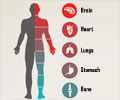Stress not only affects the mental health, but also physical health. A stressful event can suppress the benefits of eating healthy fats and increase inflammation.
Highlights
- Stress may affect the health of people who follow a healthy diet
- A stressful event can hinder the benefits of including unsaturated fats in the diet
- Take steps to reduce stress levels to reduce inflammatory biomarkers that lead to chronic diseases
People are aware that healthy eating is the key to a healthy life without chronic diseases. A healthy diet includes good fats that lower the levels of cholesterol and benefit the body. However, the benefits of good fats disappear when the person is stressed, says a new study. In this study, unstressed women who ate a breakfast with high saturated fat fared worse in blood tests for inflammatory biomarkers than those women who ate similar breakfast high in monounsaturated sunflower oil.
How can Stress Affect the Benefits of Good Fats?
Diet and stress can alter inflammation in the body. Chronic inflammation is linked to health problems such as heart disease, diabetes and rheumatoid arthritis. But a healthy diet including good fats can reduce the inflammation. Studies have also shown that stress can increase inflammation in the body. Stress has a negative effect even when an individual follows a healthy diet. To study how stress can hinder the benefits of good fats, researchers from The Ohio State University conducted a study.Kiecolt-Glaser and her collaborators knew that both diet and stress can alter inflammation in the body. They wanted to study the link between stress, diet and inflammatory markers in the bloodstream.
The current research stemmed from another study that looked at high-fat diets and depression in cancer survivors. The study included 58 women participants - 38 breast cancer survivors and 20 others - with an average of 53 years. The participants visited the Ohio State on two different days and their breakfasts were biscuits and gravy, including eggs and turkey sausages. One breakfast was high in unhealthy saturated fat from palm oil and the other high in healthy monounsaturated fats from sunflower oil, which is high in oleic acid. The participants were randomly given one of the two breakfasts. The researchers chose a high-calorie (930 calories), high-fat (30grams) breakfast to mimic a fast-food meal.
Stressful events of the participants were assessed with their previous day’s experiences and the researchers used Daily Inventory of Stressful Events questionnaire to determine if the woman was under stress. Some of the stressors were to clean up paint a child spilled all over the floor and the struggle to help a parent with dementia who was resisting help. “They’re not life-shattering events, but they’re not of the hangnail variety either,” said Kiecolt-Glaser.
The findings showed that 31 women had at least one recent stressor at one of the two visits and 21 had experienced stress before both visits and six of the women reported no significant stressful experiences prior to their visits.
The participants’ blood samples were collected during their visits. The researchers looked for two inflammatory markers C-reactive protein and serum amyloid. Two other markers called cell adhesion molecules were also evaluated. Cell adhesion molecules could predict the likelihood of plaque formation in the arteries.
“We know that a less-healthy meal is going to have adverse effects on markers of inflammation, but we wanted to look at this meal type with different types of fat,” said researcher Martha Belury, co-author of the study and a professor of human nutrition.
“This study leaves open questions about the connections between stress, fat source and healthier meals higher in fiber and fruits and vegetables and lower in calories. It’s believed that reduced inflammation could be the cornerstone of the benefits of eating healthier foods such as the Mediterranean diet – one that is high in oleic acid, usually from olive oil,” said Belury.
“It’s more evidence that stress matters,” said Kiecolt-Glaser. “It’s important to remember that inflammation creeps up over time to contribute to disease. The message here is not that you might as well eat whatever you want when you’re stressed.”
Belury said, “It could serve as a reminder to shoot for healthier choices every day so that when stress gets in your way you’re starting in a better place.”
The study supported by the National Institutes of Health is published in the Journal Molecular Psychiatry.
Tips to Reduce Stress
- Practice meditation and exercise regularly
- Plan a vacation to de-stress
- Eat a balanced diet including plenty of fruits, vegetables and nuts
- Sleep for 8 hours
- Spend time with family and friends
- Consult a psychologist
- Keep a journal to write down your thoughts
















